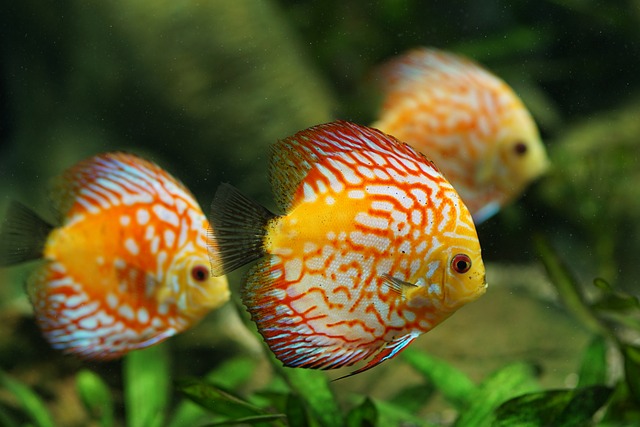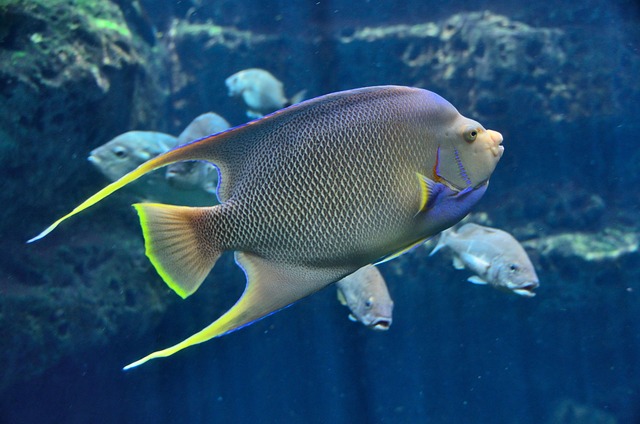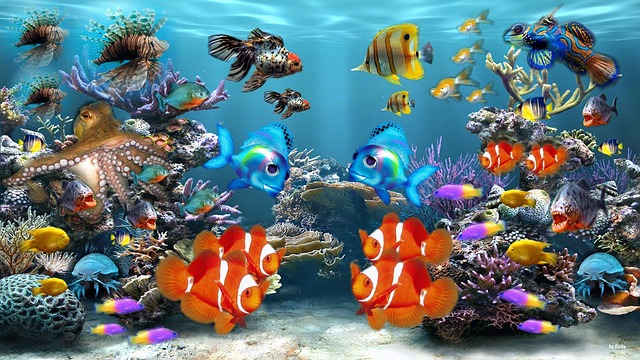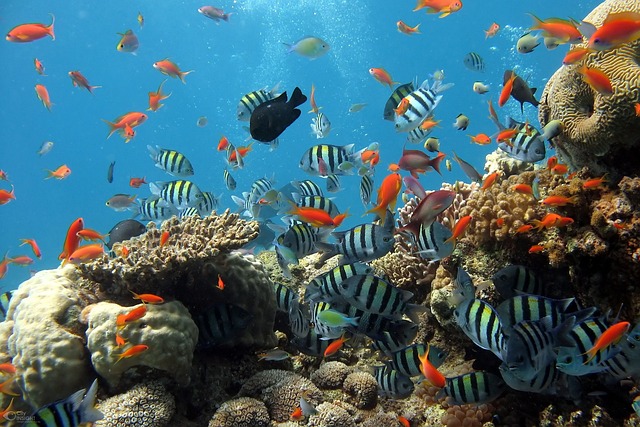Fresh and saltwater fish have many differences; they range from the size of their habitats to their actions. Knowing these differences is essential because different fish types are better suited for specific situations. In this article, we will explore the distinctions between freshwater and saltwater fish to help you make an informed decision for your aquarium.
Freshwater Fish:

Freshwater fish inhabit non-salty water bodies such as lakes, rivers, and ponds. They have adapted to these environments by developing a thicker layer of mucus on their skin, which helps protect them from infections. Freshwater fish come in various colors, shapes, and sizes. From tiny minnows that fit in the palm of your hand to massive catfish weighing over 100 pounds, there is a wide variety to choose from. Famous freshwater fish families include minnows, carp, loaches, and catfish.
One of the advantages of keeping freshwater fish is that they are generally less expensive to care for than saltwater fish. Freshwater aquariums require fewer costly filtration and lighting systems, and the fish are usually more affordable.
Saltwater Fish:

Saltwater fish, as the name suggests, are native to or commonly found in marine environments such as the ocean and seas. They have different water chemistry requirements and exhibit distinct behaviors and habitat preferences. The oceanic climate they inhabit has a higher saline content, resulting in different water chemistry compared to freshwater. Maintaining the correct water chemistry for saltwater fish is more involved than their freshwater counterparts.
Differences between Freshwater and Saltwater Fish:
Several factors distinguish freshwater and saltwater fish. Let’s take a closer look at the key differences:
1. Habitat:
Freshwater fish primarily inhabit smaller bodies of water, such as lakes and ponds. In contrast, saltwater fish thrive in the vastness of the ocean and seas. Some freshwater fish have specific habitat requirements, such as certain koi fish that can only live in ponds above a certain depth.
2. Size:
The amount of space available in the body of water that freshwater fish live in will affect their size. In contrast, saltwater fish have no limitations due to the expansive ocean. Freshwater fish adapt their size to fit the body of water they reside in.
3. Skin:
Freshwater fish have a thinner layer of skin compared to saltwater fish. This difference is attributed to the need for saltwater fish to protect themselves from the salt in their environment.
4. Diet:
Freshwater fish have a diverse diet that includes a significant portion of plant material. In contrast, saltwater fish predominantly feed on other creatures, although some species consume plants.
5. Swimming Abilities:
Freshwater fish are generally less strong swimmers than their saltwater counterparts. They rely on their fins for propulsion, while saltwater fish utilize a “flapping” motion of their fins.
These are just a few of the differences between freshwater and saltwater fish. By understanding these distinctions, you can make an informed decision when choosing the type of fish for your aquarium.
Choosing the Right Aquarium:

To provide the best environment for your fish, it’s essential to choose the appropriate aquarium based on the type of fish you intend to keep. Freshwater fish thrive in freshwater aquariums, as they have specific requirements that saltwater aquariums cannot fulfill. Similarly, saltwater fish are better suited to saltwater aquariums. However, with careful adjustments to water chemistry, keeping both types of fish in the same aquarium is possible. This may require a more giant-capacity aquarium and a more extensive filtration system. Maintaining the correct water chemistry is crucial to ensure the survival and well-being of freshwater and saltwater fish.
The Cost of Caring for Freshwater and Saltwater Fish:
The cost of caring for freshwater and saltwater fish can vary depending on several factors, including the aquarium size, the type of fish, and the level of care required. However, saltwater fish are generally more expensive to care for than freshwater fish.
Here is a breakdown of some of the costs associated with caring for freshwater and saltwater fish:
- Aquarium: The cost of an aquarium will vary depending on the size, material, and features. A small freshwater aquarium can cost as little as $50, while a large saltwater aquarium can cost several thousand dollars.
- Fish: The cost of fish will vary depending on the type of fish, the size, and the rarity. Freshwater fish are generally less expensive than saltwater fish.
- Food: The cost of food will vary depending on the type of fish and the amount of food they eat. Freshwater fish typically eat various foods, including flakes, pellets, and live food. Saltwater fish usually eat a more specialized diet, such as live brine or mysis shrimp.
- Filters: Filters are essential for keeping aquarium water clean. The cost of a filter will vary depending on the aquarium’s size and the filter type.
- Lighting: Lighting is essential for the health of fish and plants. The cost of illumination will vary depending on the lighting type and the aquarium size.
- Maintenance: Aquariums require regular maintenance, such as water changes, cleaning, and testing. The cost of care will vary depending on the aquarium’s size and maintenance frequency.
The cost of caring for freshwater and saltwater fish can be significant. However, the cost can be offset by the enjoyment of owning and caring for these beautiful creatures.
Tips for Keeping Both Types of Fish:

If you plan to keep both freshwater and saltwater fish in the same aquarium, consider the following tips:
- Maintain Correct Water Chemistry: Ensure that the water chemistry is suitable for both types of fish. Freshwater should be fresh and clean, as unclean water can make saltwater fish sick, and used water can harm freshwater fish.
- Provide Appropriate Diet: Feed both types of fish according to their specific dietary requirements. Freshwater fish need a diet rich in plant material, while saltwater fish require a diet with other creatures.
- Control Water Temperature: Keep the water temperature within the optimal range for each type of fish. Freshwater fish typically thrive in cooler temperatures, while saltwater fish prefer tropical conditions.
- Consider Water Volume: Freshwater fish can thrive in smaller water volumes than saltwater fish. Ensure that the aquarium provides sufficient space for both types of fish.
These tips can create a harmonious environment for fresh and saltwater fish in the same aquarium.
Conclusion:
In conclusion, freshwater and saltwater fish possess distinct characteristics that make them well-suited for their respective habitats. From differences in water chemistry requirements to diet preferences and swimming abilities, each type of fish has unique traits. By understanding these disparities, you can make informed decisions regarding the type of fish and the aquarium that best meets their needs. Whether you opt for a freshwater or saltwater aquarium, proper care and attention to water chemistry and dietary requirements are essential for the well-being of the fish.
Can I keep freshwater and saltwater fish together in the same aquarium?
While maintaining both types of fish in the same aquarium is possible, it requires careful water chemistry adjustment and consideration of their specific needs.
Do freshwater fish and saltwater fish have different dietary requirements?
Freshwater fish primarily feed on plant material, while saltwater fish consume other creatures. It’s essential to provide the appropriate diet for each type of fish.
Which type of fish is generally more expensive to care for, freshwater or saltwater?
Freshwater fish are generally less costly to manage compared to saltwater fish. The equipment and maintenance costs for freshwater aquariums are typically lower.
Do freshwater fish and saltwater fish require different water temperatures?
Freshwater fish are usually native to cooler regions and prefer lower temperatures. In contrast, saltwater fish can tolerate and thrive in tropical conditions.
Can I adjust an aquarium’s chemistry to accommodate freshwater and saltwater fish?
Changing the water chemistry to meet the requirements of both types of fish is possible. However, this may involve larger capacity aquariums and more extensive filtration systems.